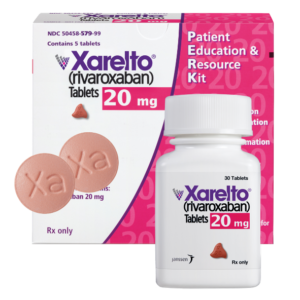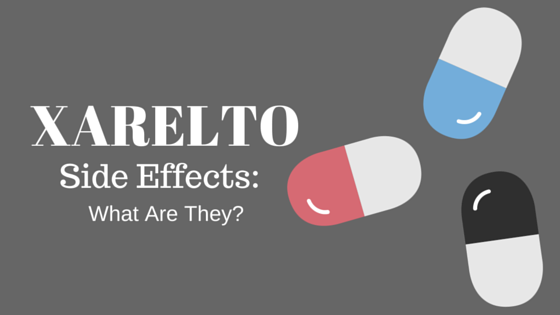For people taking Xarelto, it can be a tremendous aid in helping reduce the risk of blood clots and stroke, especially in those with atrial fibrillation. The prescription drug is also known as rivaroxaban and it is an FXa inhibitor designed to prevent deep vein thrombosis which could lead to complications in patients who undergo knee or hip replacement surgery.
As with any prescription medication, the side effects of Xarelto could affect your life quality day to day or over time. It’s important to educate yourself about these potential side effects before or while taking Xarelto; and always talk to your doctor if you experience any new symptoms or side effects.
What are the side effects of Xarelto?
Because Xarelto is a blood-clotting drug, the most common adverse reactions include bleeding complications, such as major bleeding events. Other common side effects include:
- Pain in your arms and legs
- Muscle pain
- Muscle spasms
- Fainting
- Itching
There are other common and uncommon reactions to Xarelto that should be considered before taking this drug. A common Xarelto side effect for one person may not be exhibited in another, so it’s important to talk to your doctor if you experience any abnormal symptoms following your use of the drug.
Other adverse Xarelto side effects

There are several signs of an allergic reaction that could occur while taking Xarelto, and if you experience any of these, you should seek emergency medical help right away:
- Difficulty breathing
- Hives
- Swelling of the face, lips, tongue, or throat
Serious side effects may require you to stop taking Xarelto and contact your prescribing doctor immediately. These include…
- Unexpected or severe bleeding episodes that last longer than normal, including:
- Frequent nosebleeds
- Bleeding from the gums
- Menstrual bleeding that is heavier than normal or vaginal bleeding
- Easy or excessive bruising
- Red, pink, or brown urine
- Tar-like stool that is bright red or black in color
- Coughing up blood, or blood clots
- Vomit that looks like “coffee grounds” or is mostly blood
- Headaches and feelings of dizziness or weakness
- Pain, swelling, or drainage at wound sites
Not everyone will experience the same array or severity of side effects, but if you begin to exhibit any of these you should talk to your doctor as soon as possible to avoid further complications or side effects of taking Xarelto.
At-risk conditions for side effects of Xarelto

Certain drugs may have adverse reactions with Xarelto, and likewise, certain people should not take the drug or should consult their doctor about continuing its use.
- Xarelto dosing has not been established for pregnant women, so anyone who is pregnant or becomes pregnant while taking the drug should talk to their doctor.
- Women taking Xarelto should talk to their doctor about continued use if they are or have plans to nurse.
- Some antibiotics, anticoagulants, antifungal medications, blood thinners, NSAIDs, and aspirin/aspirin-containing products may have adverse interactions when used together with Xarelto.
- Other drugs including Warfarin sodium (Coumadin, Jantoven), any heparin-containing medicine, Clopidogrel (Plavix), and anything taken to prevent or treat blood clots.
- Taking Xarelto with Ketoconazole, Clarithromycin, erythromycin, and other similar drugs could increase the risk of bleeding and should be avoided unless told otherwise by your prescribing doctor.
- Pediatric patients should not take Xarelto, as its safety and effectiveness have not yet been determined.
- If you stop taking Xarelto without your doctor’s permission, it could lead to an increased risk of stroke in those with nonvalvular atrial fibrillation or spinal/epidural hematoma.
If you currently suffer from certain kinds of abnormal bleeding or have an allergy to rivaroxaban or any of the ingredients in Xarelto, you should not take the drug.

As you can see, the side effects of Xarelto are many; but the frequency or severity with which they appear may depend on factors such as preexisting conditions and conflicts with other medication. You should also disclose preexisting prescriptions and symptoms with your doctor before taking Xarelto, as the drug might not be right for you.
